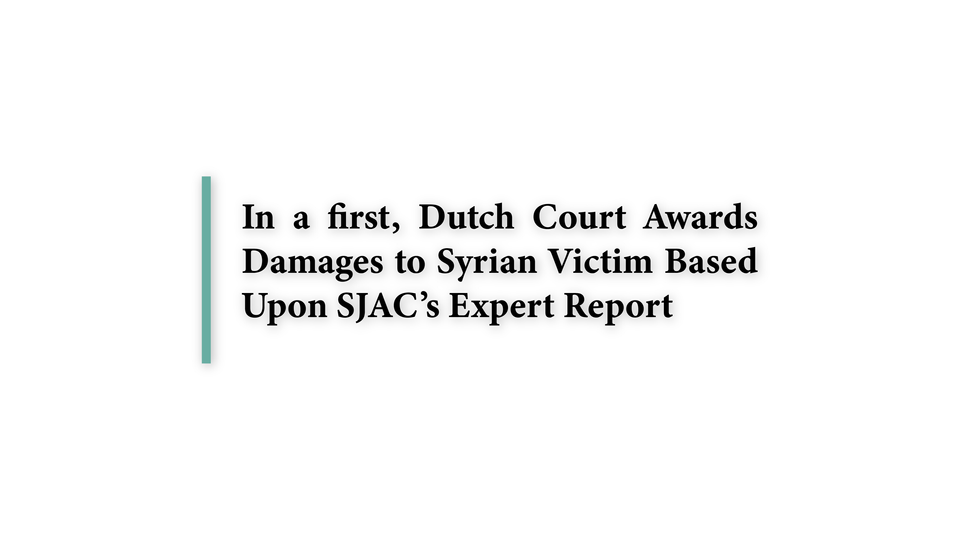
In a first, Dutch Court Awards Damages to Syrian Victim Based Upon SJAC’s Expert Report
Summary
In a landmark decision for Syrian victims and survivors, the Hague Court of Appeal awarded €40,000 to a Syrian victim of torture. The Court upheld the conviction of Mustafa A., a former commander in the pro-regime Liwa al-Quds militia, and increased his sentence to 13-year imprisonment for crimes against humanity and participation in a criminal organization. Unexpectedly, the Court also cited Syrian tort law to overturn the first instance judgement and awarded the full amount of immaterial damages claimed by the Syrian victim.
First instance judgement
The conviction of Mustafa A. was initially handed down by the District Court of The Hague in January 2024. The court found him guilty of:
- Co-perpetrating the unlawful deprivation of liberty of a Syrian civilian, an act qualified as a crime against humanity;
- Complicity in the subsequent crime of torture, also torture as a crime against humanity; and
- Participation as a leader in a criminal organization (Liwa al-Quds militia) whose aim was to commit war crimes and crimes against humanity.
Mustafa A., who held a leadership position in Liwa al-Quds, also known as the Jerusalem Brigade, played a central role in the arrest and transfer of a Syrian victim to Syria’s notorious Air Force Intelligence Directorate, where one of the victims represented in this case was detained for 20 days and subjected to torture. The first instance court found that this conduct was part of a wider, systematic pattern of state-sponsored abuse and repression of perceived opponents since the 2011 uprising. The court, accordingly, sentenced Mustafa to 12-year imprisonment.
The same court, however, deemed the victim’s claim for damages inadmissible due to insufficient understanding of Syrian law. In the Netherlands, as in many European states, civil damages in such cases are determined based upon the law of the state where the crime occurred, in this case, Syria. But the court did not have adequate means to determine how Syrian law would operate. As a result, the victims were left without an award for damages. Unfortunately, this has been the outcome in many such cases involving Syrian victims.
SJAC’s contribution
In response to a request for expert support from the victim’s representative, SJAC drafted a report clarifying key aspects of Syrian tort law relevant to claims of damages related to criminal conduct. SJAC’s legal consultant, Mr. Riad Ali, a former Syrian judge, in conjunction with its Team Lead for Case Building, Alan Haji, drafted an expert report that assisted the Appeal’s Court in interpreting Syrian tort law in line with jurisprudence of Syrian domestic courts. Prakken d’Oliveira, the legal representative of the victim, duly submitted the expert report to the Court of Appeal.
Decision of the Appeal’s Court
On August 27, 2025, The Hague Court of Appeal issued its groundbreaking decision to confirm the legal validity of the original findings of the first instance court vis-à-vis all the charges, and increased the sentence to 13 years in prison. The Court affirmed “the membership in a criminal organization” charge and, based upon SJAC’s report on Syrian tort law, the Court indicated that it had sufficient basis to deem the damages claim admissible, awarding the victim €40,000 in immaterial damages.
Concluding remarks
This case underscores the commitment of Dutch judicial system to ensure justice for victims of international crimes and sends a firm message that the Netherlands, like other states actively pursues universal jurisdiction cases, will not be a haven for perpetrators of international crimes. It also highlights the critical role of civil society organizations in supporting domestic and international justice mechanisms by filling the gaps that are inherent to the universal pursuit of justice and criminal accountability for international crimes.
SJAC hopes this judgement will prompt other states/legal systems to afford dignified and just compensation for victims of international crimes for cases within their jurisdiction. In order to support future efforts, SJAC will publish its report on Syrian tort law, in Arabic and English, in the coming weeks.
___________________________
For more information or to provide feedback, please contact SJAC at [email protected] and follow us on Facebook and Twitter. Subscribe to SJAC’s newsletter for updates on our work